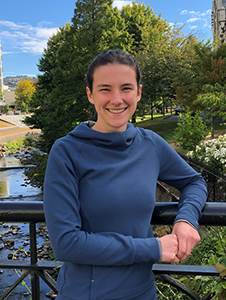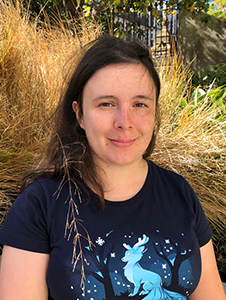Tuesday 4 May 2021 2:59pm
Students from across the University of Otago share their stories about the impact of the COVID-19 pandemic on their lives, their studies and their financial situation – and express their thanks for the extraordinary response to the Pūtea Tautoko student support fund from alumni, staff, students and friends of the University.
Stranded overseas, their studies and their personal lives disrupted by the impacts of the COVID-19 pandemic, international PhD students Grace Duke and Jessica Valisa say the support they received from Otago's Pūtea Tautoko fund has helped them cope with very challenging circumstances and made it possible for them to finish their degrees.
“I felt very relieved I could apply to Pūtea Tautoko. Just having some assurance that I have coverage for rent and food is quite beneficial. When I got the email saying my application was successful I was ecstatic, it was a big sigh of relief – I just feel really grateful.”
Grace and Jessica, along with Victoria, Duncan, Cam and Mateus who feature in the accompanying video, are some of the 2592 students in 2020 who received grants from Pūtea Tautoko – which equates to 12.5% of all students enrolled in 2020.
The total support fund of $4.1 million, which was fully used, included $2 million in direct funding from the University of Otago from its core income stream; $1.5 million from Government through its Hardship Fund for Learners; about $500,000 donated by alumni, friends, staff and students; and $20,000 from Education New Zealand.
Of those who received grants within the domestic student cohort, 505 students (19 per cent) were of Māori ethnicity and 406 (16 per cent) were Pacific students.
Students from all sectors of the University received grants, including 693 Doctoral and postgraduate students; 1,891 undergraduate students and 496 international students.
The strong bond many alumni have with Otago has never been more evident than in their response to Pūtea Tautoko – of the 700 alumni and friends who made donations to the fund, 400 were first time donors to the University.

Grace Duke
Grace, who is studying the past climate and oceanography of the Southern Ocean for her PhD, was meant to hand in her thesis in April 2020. With her partner in the UK and her family in the US, when the borders closed she suddenly felt a long way from family and friends.
“There was the emotional side [of the border closure] and then I couldn't use all the university resources, so those two factors really slowed down the drive that I had to finish my PhD. It just became really hard,” Grace says.
In June, she managed to make it to the UK to be with her partner, but “unfortunately it took me a lot longer to get back into New Zealand”. When her UK visa expired, she spent two months with her family in the US, and then managed to return to NZ in February 2021 in the first group of 250 PhD students to be allowed back into the country.
“It could well be 2022 before I can see my family again. That time in both the States and the UK helped me a lot.”
Her supervisor encouraged her to apply to Pūtea Tautoko, and she was granted a two-month rebate on her tuition and a $1,000 living grant.
“I felt very relieved I could apply to Pūtea Tautoko. Just having some assurance that I have coverage for rent and food is quite beneficial. When I got the email saying my application was successful I was ecstatic, it was a big sigh of relief – I just feel really grateful.”

Jessica Valisa
In March 2020, international Politics PhD student Jessica Valisa travelled from NZ to Austria, in the hope of being able to undertake field research in Europe on Far Right movements in Italy and how they perceive Russia.
Two days after arriving, Austria locked down, and she spent her time trying to adapt her course to online data collection and interviews.
“The first lockdown was OK, it was something new. I could work from home, and summer was a little bit better. The big problem was when the second lockdown happened in autumn, it started in November and went on and on and on.”
She found it harder to work productively from the confines of her small flat. “It becomes really challenging because every day looks exactly the same. You don't have the separation between working and leisure time because you do everything in the same place.”
She applied to Pūtea Tautoko and was granted a two-month extension to her study. “This gave me peace of mind so I could spend my time not worrying I'm not going to make it in time if I'm not productive.” It also allowed her to focus on getting back into NZ, and she arrived in mid-February.
“I'm really grateful that there are people thinking about postgraduate students and the challenges they are facing in these strange times.”
It was envisaged from the outset that Pūtea Tautoko would continue beyond 2020, as the financial impacts of COVID-19 would continue into the future. As such, funding has been provisioned in the University's 2021 Budget for the fund, and this may be augmented by ongoing fundraising, and further Government funding support.
